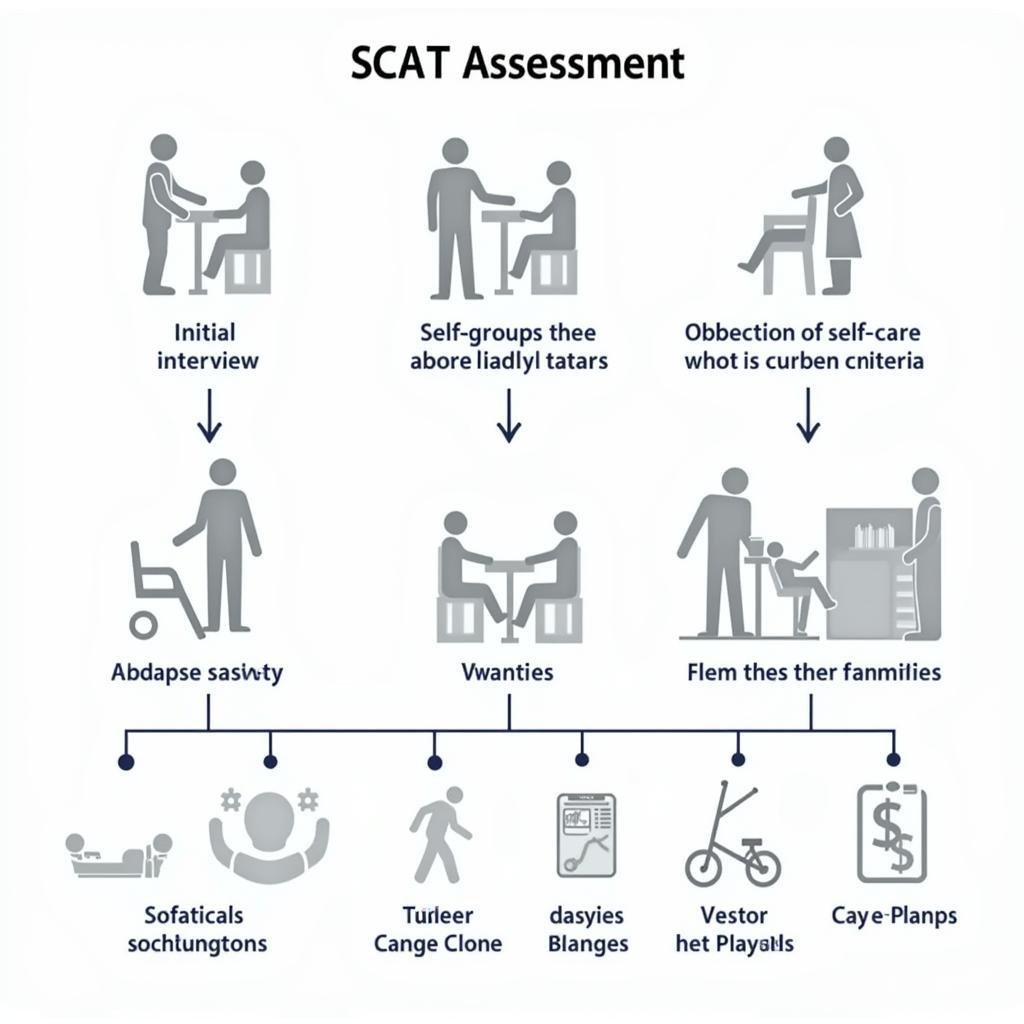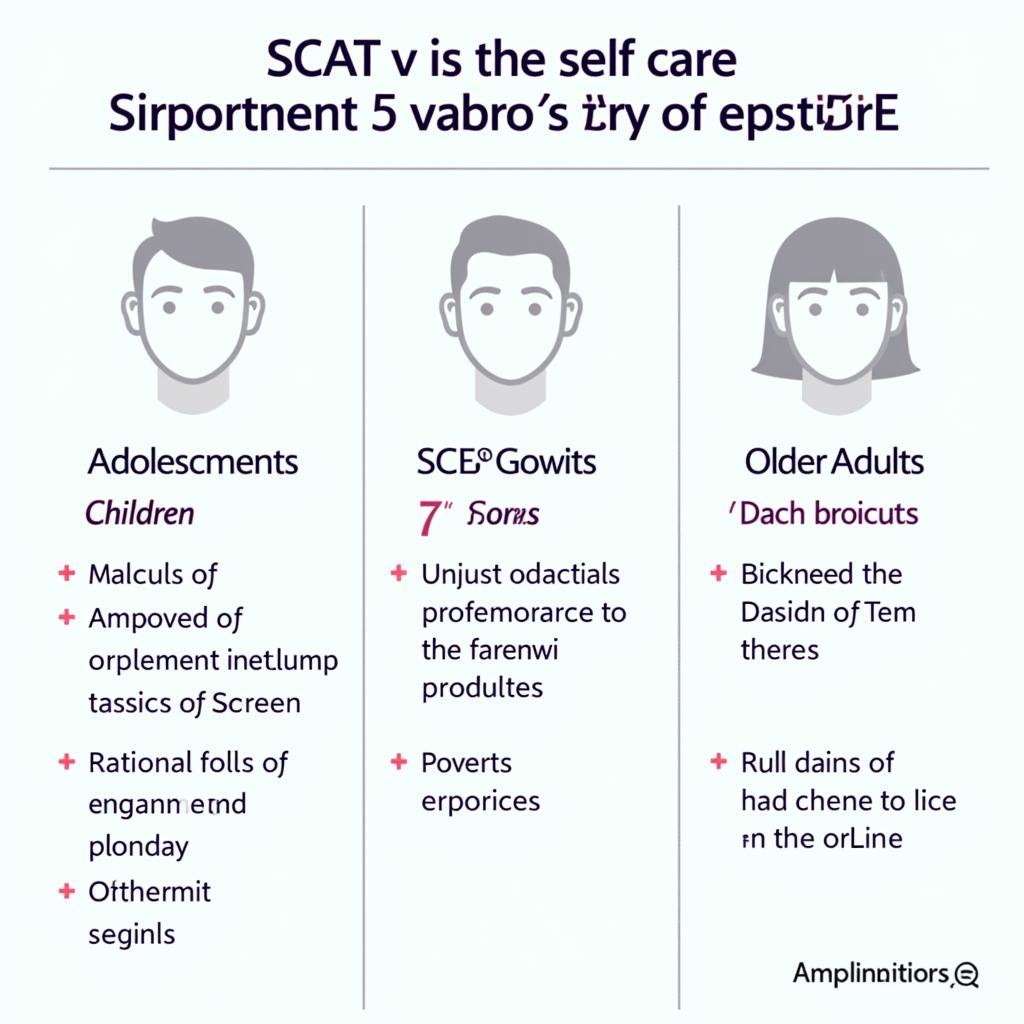The Self Care Assessment Tool (SCAT) is a valuable resource for understanding an individual’s ability to perform daily self-care tasks. It provides a structured way to assess and monitor changes in self-care abilities, which can be crucial for individuals, families, and healthcare professionals. This comprehensive guide dives into the importance of the SCAT, its applications, and how it can benefit you.
What is the Self Care Assessment Tool (SCAT)?
The SCAT is a standardized assessment tool designed to evaluate an individual’s capacity for self-care activities. It covers various aspects of daily living, such as bathing, dressing, eating, and toileting. The assessment helps identify strengths and weaknesses in self-care, allowing for targeted interventions and support. The SCAT is used across different populations and settings, from children with developmental delays to older adults experiencing age-related decline. It’s a powerful tool for tracking progress, evaluating treatment effectiveness, and empowering individuals to maintain their independence.
Why is the SCAT Important?
Self-care is fundamental to overall well-being and quality of life. The SCAT provides a clear picture of an individual’s current self-care abilities, helping to identify potential risks and prevent further decline. By using a standardized tool like the SCAT, healthcare professionals can communicate more effectively, ensure consistent evaluation, and develop tailored care plans. Furthermore, the SCAT promotes person-centered care by focusing on individual needs and empowering individuals to actively participate in their care.
 SCAT Assessment Process
SCAT Assessment Process
How is the SCAT Administered?
The SCAT can be administered by trained professionals, such as occupational therapists, physical therapists, nurses, and other healthcare providers. The assessment involves observing the individual performing specific self-care tasks or, if direct observation isn’t feasible, gathering information through interviews and questionnaires. The results are then scored based on predefined criteria, providing a quantifiable measure of self-care ability. This standardized approach ensures consistency and accuracy in evaluating self-care performance.
Who Can Benefit from the SCAT?
The SCAT can be beneficial for a wide range of individuals, including:
- Children with developmental delays: The SCAT helps identify areas where children may need extra support to develop essential self-care skills.
- Individuals with disabilities: It assesses the impact of disabilities on self-care and informs the development of assistive devices and adaptive strategies.
- Older adults: The SCAT helps monitor age-related changes in self-care abilities and promotes independence.
- Individuals recovering from illness or injury: It tracks progress during rehabilitation and identifies areas for continued support.
Different Versions of the SCAT
Understanding that different age groups and populations have unique needs, there are variations of the SCAT available. These variations are tailored to specific developmental stages and cognitive abilities, ensuring a more accurate and relevant assessment. The appropriate version of the SCAT will be chosen based on the individual’s age, cognitive status, and specific needs.
 SCAT Variations for Different Age Groups
SCAT Variations for Different Age Groups
Interpreting SCAT Results
Interpreting the results of the SCAT requires expertise and should be done by a qualified healthcare professional. The scores provide valuable insights into an individual’s self-care abilities, highlighting areas of strength and weakness. These insights are then used to develop personalized care plans, recommend appropriate interventions, and track progress over time.
“The SCAT is more than just a scoring system. It’s a tool that empowers individuals to understand their own self-care needs and actively participate in their care planning,” says Dr. Emily Carter, a leading Occupational Therapist specializing in geriatric care.
Using the SCAT to Improve Self-Care
The SCAT is not just about assessment; it’s about empowerment. By identifying specific areas needing improvement, the SCAT can inform personalized interventions and support strategies. These may include therapy sessions, adaptive equipment, and caregiver training, all aimed at enhancing self-care abilities and promoting independence.
“The SCAT allows us to move beyond a generalized approach to care and tailor interventions to the specific needs of each individual, leading to more effective outcomes,” adds Dr. James Miller, a renowned Physical Therapist with expertise in rehabilitation.
Conclusion
The Self Care Assessment Tool (SCAT) is a vital resource for assessing and improving self-care abilities across different populations. By providing a structured and standardized approach, the SCAT helps individuals, families, and healthcare professionals gain a clear understanding of self-care needs, develop targeted interventions, and promote independence and overall well-being.
FAQ
- What does SCAT stand for? SCAT stands for Self Care Assessment Tool.
- Who can administer the SCAT? Trained healthcare professionals, such as occupational therapists and nurses.
- How long does a SCAT assessment take? The duration varies depending on the individual and the specific version of the SCAT being used.
- Is the SCAT used for children? Yes, there are versions of the SCAT designed specifically for children.
- What are the benefits of using the SCAT? It helps identify self-care needs, track progress, and inform personalized interventions.
- How can I find a professional to administer the SCAT? Consult your physician or contact a local rehabilitation center.
- Is the SCAT covered by insurance? Coverage varies depending on your insurance provider and the reason for the assessment.
Need assistance? Contact us via WhatsApp: +1(641)206-8880, Email: [email protected] or visit us at 910 Cedar Lane, Chicago, IL 60605, USA. Our customer support team is available 24/7.

Leave a Reply